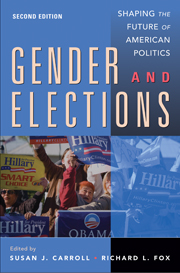Book contents
- Frontmatter
- Contents
- List of Figures, Text Boxes, and Photos
- List of Tables
- Acknowledgments
- Contributors
- Introduction: Gender and Electoral Politics in the Early Twenty-First Century
- 1 Presidential Elections: Gendered Space and the Case of 2008
- 2 The 2008 Candidacies of Hillary Clinton and Sarah Palin: Cracking the “Highest, Hardest Glass Ceiling”
- 3 Voter Participation and Turnout: Female Star Power Attracts Women Voters
- 4 Voting Choices: The Politics of the Gender Gap
- 5 Latinas and Electoral Politics: Movin' on Up
- 6 African American Women and Electoral Politics: A Challenge to the Post-Race Rhetoric of the Obama Moment
- 7 Congressional Elections: Women's Candidacies and the Road to Gender Parity
- 8 Political Parties and Women's Organizations: Bringing Women into the Electoral Arena
- 9 Advertising, Web Sites, and Media Coverage: Gender and Communication along the Campaign Trail
- 10 State Elections: Why Do Women Fare Differently across States?
- Index
- References
1 - Presidential Elections: Gendered Space and the Case of 2008
Published online by Cambridge University Press: 05 June 2014
- Frontmatter
- Contents
- List of Figures, Text Boxes, and Photos
- List of Tables
- Acknowledgments
- Contributors
- Introduction: Gender and Electoral Politics in the Early Twenty-First Century
- 1 Presidential Elections: Gendered Space and the Case of 2008
- 2 The 2008 Candidacies of Hillary Clinton and Sarah Palin: Cracking the “Highest, Hardest Glass Ceiling”
- 3 Voter Participation and Turnout: Female Star Power Attracts Women Voters
- 4 Voting Choices: The Politics of the Gender Gap
- 5 Latinas and Electoral Politics: Movin' on Up
- 6 African American Women and Electoral Politics: A Challenge to the Post-Race Rhetoric of the Obama Moment
- 7 Congressional Elections: Women's Candidacies and the Road to Gender Parity
- 8 Political Parties and Women's Organizations: Bringing Women into the Electoral Arena
- 9 Advertising, Web Sites, and Media Coverage: Gender and Communication along the Campaign Trail
- 10 State Elections: Why Do Women Fare Differently across States?
- Index
- References
Summary
The presidential election of 2008 began November 3, 2004, the day after the 2004 election. Shortly thereafter, a tongue-in-cheek Associated Press (AP) article led with the following: “Wanted: a former altar boy from the Southwest who speaks Spanish, married into a rich Republican family from Ohio and revolutionized the Internet after working as a volunteer firefighter in Florida. Position: president of the United States.” Using findings from exit polls to construct the profile of the perfect presidential candidate for 2008, the article went on to propose that he
Be “a Medal of Honor winner” with combat experience who helped normalize relations with Vietnam
Love outdoor sports and drop his g's “when talkin' about huntin' and fishin' and car racin'”
Be a former quarterback for the University of Michigan Rose Bowl team
Be a “trained economist who taught in Minnesota, where he met his wife, a nurse,” whose father is a former governor
Be “a volunteer fireman” who “drove his pickup truck to help out the World Trade Center site”
Be “a billionaire in his own right who developed software”
Although not fitting this profile, five prominent men and Hillary Rodham Clinton were mentioned in this article as potential candidates. It closed with, “Mr. Perfect might be a Mrs. – the first woman to head a majority party ticket. But it would be a lonely job, what with her husband fighting in Iraq.”
For presidential candidacies, the press serves as the great mentioner, without whose attention no candidate can be seen as viable.
- Type
- Chapter
- Information
- Gender and ElectionsShaping the Future of American Politics, pp. 13 - 43Publisher: Cambridge University PressPrint publication year: 2009



